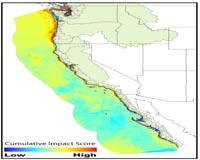| . |  |
. |
Manado, Indonesia (AFP) May 14, 2009 Ministers and officials from more than 70 nations called Thursday for oceans to be included on the agenda of global climate change talks aimed at finding a successor to the Kyoto Protocol. Delegates at the World Ocean Conference in Indonesia urged joint action to reverse the impact of climate change on the oceans and for the issue to be included in crucial climate talks in Copenhagen in December. The Manado Ocean Declaration calls for cuts to ocean pollution, funding for sustainable development in poor countries, greater research into how climate change affects the ocean and the role oceans play in fighting climate change. "The declaration represents a political commitment by participating governments to address the common questions of sea level rises, ocean acidification, changing weather patterns and other climate-related phenomena," US delegation head Mary Glackin said. The non-binding declaration contained no specific commitments for funding or emissions targets and was criticised by some scientists as too weak to combat likely devastating sea rises and the destruction of key species. Delegates also said pressure from developing countries including the United States, Canada and Australia saw the watering down of key declaration clauses that would have made stronger calls for the inclusion of oceans in a post-Kyoto framework and the provision of funding for poor countries. The outcome of the talks was "disappointingly weak given the severity of the problem," Ove Hoegh-Guldberg, a scientist at Australia's University of Queensland, told AFP. "If their commitment is weakening then this is all going to unravel," he said. Hoegh-Goldberg was the lead author of a report commissioned by environment group WWF this week that said reefs in Southeast Asia's Coral Triangle could disappear by the end of the century if greenhouse gas emissions are not drastically cut. The collapse of the region, said to be the ocean's richest ecosystem and home to half the world's coral, would destroy food and livelihoods for over 100 million people and trigger mass migration to cities and neighbouring countries. The report is one of a number of gloomy scenarios floated at the five-day conference, billed as the first time nations have gathered to discuss the link between oceans and climate. US Secretary of State Hillary Clinton told delegates in a recorded statement that nations needed to work harder to conserve oceans and fight climate change. "Changes to our oceans threaten their ability to provide for their families and make a better life for their children," she said. Indonesian President Susilo Bambang Yudhoyono warned the future of the oceans was a "life and death issue" for humanity. "Today it is time for the world to hear yet another important message: that we can only survive the 21st century if we are united in caring for and preserving our oceans," Yudhoyono said. Australian Environment Minister Peter Garrett said the declaration was significant. "You can't underestimate how important it is to have such a significant number of countries sign on," he said. "This is an important declaration and it will enable strong and positive and constructive actions to be taken." But the head of a bloc representing small island nations likely to be the hardest hit by rising sea levels said the agreement was only a small step in long negotiations to replace Kyoto when it expires in 2012. "I don't think it's adequate... but I think the pieces of the solution are being laid and that is important at this juncture," Grenada's ambassador to the UN and Alliance of Small Island States chairwoman Dessima Williams said.
Share This Article With Planet Earth
Related Links Water News - Science, Technology and Politics
 Scientists Map West Coast Areas Most Affected By Humans
Scientists Map West Coast Areas Most Affected By HumansSanta Barbara CA (SPX) May 13, 2009 Climate change, fishing, and commercial shipping top the list of threats to the ocean off the West Coast of the United States. "Every single spot of the ocean along the West Coast," said Ben Halpern, a marine ecologist at the National Center for Ecological Analysis and Synthesis (NCEAS) at the University of California, Santa Barbara, "is affected by 10 to 15 different human activities annu ... read more |
|
| The content herein, unless otherwise known to be public domain, are Copyright 1995-2009 - SpaceDaily. AFP and UPI Wire Stories are copyright Agence France-Presse and United Press International. ESA Portal Reports are copyright European Space Agency. All NASA sourced material is public domain. Additional copyrights may apply in whole or part to other bona fide parties. Advertising does not imply endorsement,agreement or approval of any opinions, statements or information provided by SpaceDaily on any Web page published or hosted by SpaceDaily. Privacy Statement |